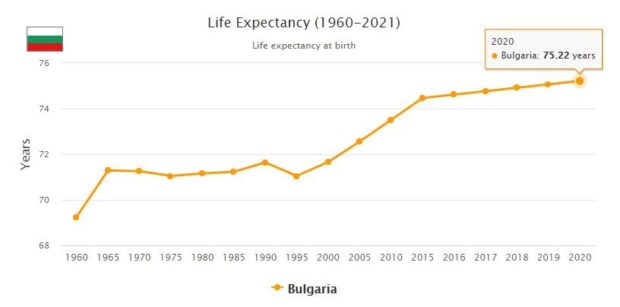Bulgaria is a country located in Southeastern Europe, bordered by Romania, Serbia, North Macedonia, Greece and Turkey. According to homosociety, it has a population of around 7 million people and an area of 110,994 square kilometers. The capital city is Sofia while other major cities include Plovdiv, Varna and Burgas. The official language of Bulgaria is Bulgarian but English is also widely spoken. The currency used in Bulgaria is the Bulgarian Lev (BGN) which is pegged to the Euro at a rate of 1 BGN : 0.511 EUR. Bulgaria has a rich culture with influences from both Slavic and Ottoman cultures, from traditional music such as Chalga to unique art forms like Martenitsa weaving. It also boasts stunning natural landscapes such as the Balkan Mountains and Black Sea Coast which are home to an abundance of wildlife species.
See abbreviationfinder for geography, history, society, politics, and economy of Bulgaria. After 40 years of struggle to regain independence, in 1870 the Bulgarian church reached an agreement with the Sultan, allowing the creation of an archdiocese with 15 dioceses under it. The first archbishop and his successors were considered “troublemakers” and were banned by the Greek Church Father, which merely helped to bolster Bulgarian nationalism.
From 1876, a number of Bulgarian uprisings were at their worst. Some of the Bulgarian volunteers joined the Russian and Serbian armies at war with the empire. In the San Stefano Treaty, Moscow was forced to establish a Bulgarian state, but European superpowers feared it would become a Russian vassal state in the Balkans.
At the Berlin Congress of 1878, the great powers agreed to establish “the autonomous province” of Rumelia in the southern part of the country, formally subject to the Sultanate, as well as a Bulgarian state in the northern region, but Macedonia remained part of the Ottoman Empire. The responsibility for the constitution and the election of the new state government was laid in the hands of a nobility council.
- COUNTRYAAH.COM: Provides latest population data about Bulgaria. Lists by Year from 1950 to 2020. Also includes major cities by population.
The Constitution, passed by this Assembly and one of the most liberal of the time, introduced a curtailed monarchy. Alexander of Battenberg, grandson of Alexander II of Russia, was subsequently elected Prince, and sat on the throne in July 1878 with an obligation to abide by the Constitution – which he abolished two years later!
The Prince formed a dictatorial government led by Russian general LN Sobolev, supported by conservative sectors of society. The death of the Russian czar partly moderated Alexander’s policy, becoming more “Bulgarian friendly”. In 1885 he supported the rebellion of the Liberals in Rumelia which led to the deposition of the governor and the proclamation of a union with Bulgaria.
The Bucharest and Top Khané treaties, both signed in 1886, recognized Prince Alexander as governor of Rumelia and Bulgaria, but he was forcibly deposed by Russia and forced to abdicate. In an attempt to find a candidate who could satisfy both Russia and the rest of Europe, the Bulgarians eventually proclaimed Ferdinand of Saxony-Coburg-Göttingen.
With the support of Vienna, London, Rome and Russia, Ferdinand overcame the mistrust of the first period, and he became a central figure for the return of the Bulgarians who, according to the Berlin Agreement, had stayed abroad. The prince took advantage of the situation to declare Bulgaria independent in 1908 and abolished the formal dependence on Turkey.
In 1912, Bulgaria signed secret, military agreements with Greece and Serbia. In October of that year, Montenegro declared war on Istanbul and received support from the Balkan allies. In May, Turkey signed the surrender of its European territories, located north of a line drawn from Enos in the Aegean and Midia in the Black Sea.
However, the Allies did not agree with the split; Bulgaria came into conflict with Greece and Serbia, which later gained support from Romania. The Second Balkan War ended quickly with the defeat of the Bulgarians. Macedonia was split in August 1913 between Greece and Serbia, but Romania was allocated a rich area in northern Bulgaria.
